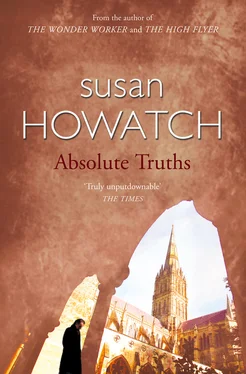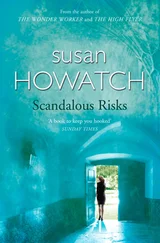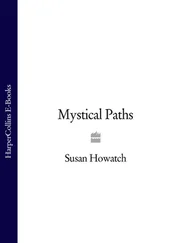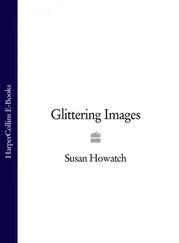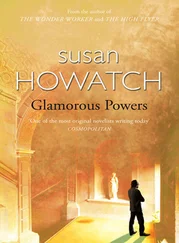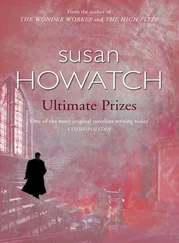Let me say at once that Aysgarth did have virtues: he had a good brain, a talent for administration, a genius for fund-raising, a not inconsiderable gift for forceful preaching and a certain range of social skills which made him popular in Starbridge. A self-made man, he had a chip on his shoulder about his origins in Yorkshire where his father had been in trade. This inferiority complex manifested itself in frequent references to the fact that he had read Greats at Oxford. (He was a scholarship boy, of course.) Not having a degree in theology he was hostile to those who had, but I must in all fairness concede that he was a sincere Christian. Unfortunately, after an upbringing among the crudest kind of Non-Conformists and an intellectual reaction in which he had embraced the wildest forms of Liberal Modernism, his theological outlook was, to put it kindly, confused.
When he became Dean – at the same time as I became Bishop; a testing stroke of providence – he made no secret of the fact that he disapproved of the habit of receiving the sacrament more than once a week, and that he thought auricular confession was Papist poppycock. One simply cannot go around making those sort of statements if one is the dean of a great cathedral in the middle of the twentieth century. I concede that one may be allowed to think them; after all, in our broad Church Protestants and Catholics are equally welcome, but such thoughts should be kept private and balanced by a determination not only to be tolerant of the other side but to learn from it. The older cathedrals in England are shrines to the pre-Reformation Catholic tradition and are now witnesses to our famous Anglican ‘Middle Way’ where the Catholic theology of the sacraments embraces the Protestant theology of the Word; in consequence a dean has no business making inflammatory statements in the manner of some Non-Conformist fanatic who bawls out: ‘No Popery!’ whenever he sees a statue of the Virgin Mary.
Fortunately Aysgarth was no fool and he soon realised he had to modify his stance in order to avoid giving offence to a great many people. He backtracked on auricular confession, although he refused to hear penitents himself, and he swore devotion to the cause of ecumenism, the reconciliation of the different branches of the Church, although his statements were strangely silent on the subject of Rome; I suspect he confined his ecumenical yearnings to union with the Methodists. But despite this improved behaviour he still failed to show up regularly at the early morning weekday services, and during the months when he was officially ‘in residence’ he constantly delegated the saying of matins and the celebration of Communion to one of the minor canons. (Lyle said Aysgarth needed the extra time in bed in order to recover from his hangovers, but this charge was not evidence of Aysgarth’s drinking habits but of Lyle’s dislike.)
The upshot of all these abstentions from public worship was that I soon felt obliged to give the residentiary Canons the spiritual lead which he was apparently unwilling to provide, so I started turning up more regularly at the Cathedral’s early services. I was careful not to exaggerate my response. I did not turn up every day. But I appeared at least twice during the week and often three times.
That made Aysgarth reform with lightning speed. His competitive nature ensured that he could not bear to be outshone by me, particularly on his own territory, and the embarrassing absences ceased.
This tense game of spiritual one-upmanship, with all its revolting worldly implications of rivalry, dislike and distrust, was played between us for six years in an atmosphere which, despite repeated clashes of opinion, we managed to keep tolerably civilised. By that I mean we never actually had a row, although we often came close to one. Then in 1963, as Jon put it in his old-fashioned way, ‘the Devil wriggled into the Cathedral and caused havoc.’ It is not my purpose now to describe the events of 1963, but this was the year when Aysgarth commissioned a pornographic sculpture for the Cathedral churchyard.
I regret to say that there was even more going on than this row over the sculpture (the commission was eventually cancelled), but I still cannot bring myself to write about what Aysgarth was getting up to on his days off. Some forms of clerical misbehaviour really do have to be buried six feet deep for the good of the Church. I think I may divulge, however, without going into lurid detail, that his two most dangerous habits at that time were a tendency to drink too much and an inclination to be undignified with women many years his junior.
Naturally I wanted to sack him, but I had no power. The Deanery was a Crown appointment, made by the Prime Minister on the Queen’s behalf, and although I could have threatened to make a considerable fuss in high places in an attempt to extort his resignation, it had seemed clear that my duty was to conceal the scandal, not risk exposing it. In the end I took the pragmatic course, aiming for rehabilitation by forcing Aysgarth to pray about his situation with Jon’s guidance, and fortunately by that time Aysgarth was so shattered by the consequences of his aberrations that he did not even have the strength to whisper: ‘No Popery!’ when compelled to seek help from an Anglo-Catholic spiritual director.
Jon patched him up until he was once again capable of running the Cathedral with dignity. Then Jon began the task of patching up me. I was the bishop, and in the manner of Harry Truman I could have kept on my desk a sign which read: THE BUCK STOPS HERE. There could be no denying the fact that the cathedral of my diocese was in a mess, and like Aysgarth I had to kneel before God, confess my part in the disaster and pray for the grace to do better. It was only after this ritual had been performed that Jon and I tried to work out how to cleanse the poisoned atmosphere and mend the fractured community.
Jon never held a session which Aysgarth and I both attended, but he suggested to each of us that the Bishop, Dean and Chapter should all make a habit of praying together, and when he judged that the moment was right I held a meeting at the South Canonry. Here it was agreed that for six months all five of us would attend matins daily and all five of us would participate together in the early service of Holy Communion at least once during the week. I also suggested that once a month we all met at the South Canonry to discuss any contentious issues in a calm atmosphere over coffee.
Life improved. The coffee meetings were a failure, since everyone was so nervous of a quarrel that nothing contentious was ever discussed, but at least afterwards the Canons were more willing to confide in me whenever Aysgarth drove them to distraction. Meanwhile the daily attendance at weekday matins had become a successful routine and we all stayed on for Communion on Wednesdays. This agreed pattern of worship should have meant that Aysgarth and I were free to abandon our game of spiritual one-upmanship, but I noticed that whenever I chose to exceed the agreed pattern and stay on for an additional Communion service, he usually stayed on too. However I thought it best to try to believe this was because of changed spiritual needs and had no connection with our old rivalry.
I must at this point give credit where credit is due and admit that Aysgarth worked just as hard as I did to eliminate the spiritual decay which had affected our community. He kept himself sober, behaved immaculately with young women and worked hard to raise money to restore the Cathedral’s crumbling west front. It was then I realised that Aysgarth’s principal talent, the one which outshone all the others, was for survival.
It would be untrue to say we became friends, but we did make elaborate attempts to be pleasant to each other. ‘And bearing in mind our temperamental incompatibility,’ I said to Jon, ‘even elaborate attempts to be pleasant must represent some sort of modest spiritual triumph,’ but Jon immediately became very austere.
Читать дальше
